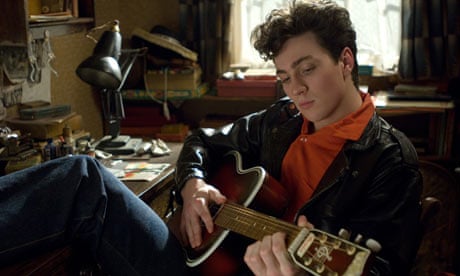As composers, performers, producers and the subjects of documentaries, John Lennon, Paul McCartney, George Harrison and Ringo Starr have made a remarkable contribution to the cinema over the years. The dominant figure, of course, has been Lennon. He's been impersonated by his fellow Liverpudlian Ian Hart in both Backbeat, Iain Softley's film about the Beatles in Hamburg, and The Hours and Times, Christopher Munch's picture about his 1963 trip with Brian Epstein to Barcelona, and more fleetingly in Todd Haynes's Bob Dylan movie I'm Not There. He's at the centre of a fascinating documentary on his political activities, The US vs John Lennon (2006) and haunts the shadowy edges of The Killing of John Lennon, Andrew Piddington's 2006 portrait of his assassin, Mark Chapman. Now we have Sam Taylor-Wood's feature debut, Nowhere Boy, an account of his late teens on Merseyside. Her superbly acted film stars the 19-year-old Aaron Johnson, who bears only the slightest physical resemblance to Lennon.
One would have expected a stark or experimental biopic from an avant-garde artist like Taylor-Wood, something comparable, say, with Julian Schnabel's film about the French writer Jean-Dominique Bauby, The Diving Bell and the Butterfly, or Steve McQueen's study of Bobby Sands, Hunger. Instead, she has truly surprised us by making a highly conventional film that most closely resembles That'll Be the Day (1973), starring David Essex as a composite character partly modelled on John Lennon, who drops out of grammar school to pursue a musical career. It ends as he's on the threshold of success and a sequel, Stardust, examines his rapid rise and fall.
Scripted by Matthew Greenhalgh, who wrote the screenplay for Control, the biopic of punk singer Ian Curtis, Nowhere Boy covers five years in Lennon's life, from the death in 1955 of his Uncle George (David Threlfall), a kindly dairyman, to his departure for Hamburg with the nucleus of the Beatles at the age of 19. The aim appears to be to recapture the ordinariness of English lower-middle-class life as led by the Beatles and the Stones, before the second wave of rock'n'roll swept over Britain as part of a cultural revolution from which we're still reeling.
Seamus McGarvey's low-key photography renders the drabness of that world, still emerging from postwar austerity, without making it appear unduly depressing. The film begins with a high-spirited John cycling to school, passing the entrance to Strawberry Field and cheekily chatting up a group of girls. In an intriguing early scene, subtly defining the times, the playful Uncle George instals a loudspeaker in John's bedroom to relay programmes from the radio downstairs, where Aunt Mimi (Kristin Scott Thomas) is listening to a classical concert. There used to be a piece of apparatus like that in every home at a time when radios were expensive items and transistors a thing of the future. It now seems as remote as a crystal set.
The movie is framed by two crucial funerals and dominated by two women. The first funeral is that of Uncle George who dies of a heart attack, the second of John's mother, Julia (Anne-Marie Duff), killed in a road accident. The women are Aunt Mimi, with whom John has lived since the age of four, and Julia, who virtually abandoned him in 1944. After the first funeral, John is reunited with his mother, who returns to become a dominant figure in his life; at the second, he realises he must break away and start an independent life as a musician. There are also two contrasted visits to Blackpool involving Julia, one a flashback to John's early childhood.
Aunt Mimi is a prim, lower-middle-class housewife, childless and bringing up John as a son, trying to instil petit bourgeois values into him but spurning serious ambition. She's got him into Quarry Bank, a solid grammar school that shortly before had produced two eminent intellectuals, the future Labour cabinet ministers Peter Shore and Bill Rodgers. Mimi's austere, neatly kept home is contrasted with the lively, messy household of mother Julia, now married with two daughters, her husband a decent quiet man (David Morrissey), who is in his way as long-suffering as Uncle George.
The flirtatious, flamboyant Julia has an almost incestuous relationship with her son, encouraging his interest in music, protecting him when he plays truant from school, introducing him to rock'n'roll and explaining its sexual connotations. In Freudian terms, the stern Mimi, a practitioner of what we now call "tough love", is at work on John's superego, while the rebellious Julia, offering unconditional love, is exciting his id. In religious terms, they're his good and bad angels. Eventually, he treats both in a cruel manner and with a dismissive wit we now know to be characteristic. As Philip Larkin, who thought sexual intercourse began three years after Nowhere Boy ends and just before the Beatles' first LP, might have said, they fuck you up your mum and aunt, they do not mean to but they do.
Oddly enough, the music is the least significant part of the film. There are a few references to the later oeuvre, including John engaging in a sexual activity that was to be memorably if obliquely celebrated in the song "Penny Lane". We see him getting banjo lessons from Julia, buying his first guitar, forming the Quarrymen, giving himself an Elvis hairdo, switching to Buddy Holly-style hornrims, meeting Paul McCartney, being refused entry to the Cavern. But rather than dwelling on the unique circumstances that produced a musical genius, it's an affecting movie about coming of age and leaving home, and about the radical changes in British life since the Second World War.
